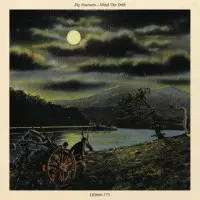When a band writes a phenomenal album, all the fans want is a repeat for the followup. When Here Come the Waterworks came out in 2007, it had everything that Head for the Shallow was missing. The riffs were bigger, the bass was louder, the drums were heavier, the songs were smarter, faster, etc. It seemed like there was no more room to grow.
And there wasn't. At least not in the current lineup. See: 2008. Jared and Coady, deciding that they weren't in any mood to try and work out a sequel on their own, recruited guitarist and knob-turner Toshi. And though both previous albums had Jared laying down the random guitar track here or there, the band now had a dedicated instrument player with 33 percent more room for growth, expansion, and creative input.
And I can't figure out if that's a good thing or a bad thing.
Most bands, when they add a member, exhibit traces of their influence. Big Business, however, re-organized their entire songwriting structures. Jared's bass is recorded low, and Toshi's guitar is turned way high in the mix, but his playing revolves around classical melodies and atmospheric dissonance more than adding weight to the band. Coady's playing isn't, well, restrained, but it's definitely planned out and less fluid. But maybe after two snarling records of riffs, biffs, and absurdest lyrics, the band was ready to tone it down anyway.
It's not an album to introduce people to the band with, that's for sure. Maybe hanging out with the Melvins helped them get a little freakier.
Old fans will rejoice in "Found Art," "Gold and Final," "The Drift" and "Cold Lunch." All four songs stumble around the room like a drunk elephant (who suddenly learned how to sing in harmony as well), taking the best of the old elements of the band and mixing them with the band's new dedication to melody, harmony, and song structure. "I Got It Online," however, is a grating, driving riff with random shouted statements over it from one of the non-Jared band members. "Cats, Mice," is a strange waltz and "Ayes Have It" is a synth-powered sailor's dirge. The album is capped with the slow-building "Theme from Big Business II," an over-long song that shows off the band's newfound songwriting skills that frankly lets the album die with a whimper instead of a roar.
Repeated listens shows the layers behind each song and the time spent putting everything together. But it's hard not to feel like this album might be a betrayal of the band's spirit. Growth and change are hard to stomach from time to time, and let's not forget that at one time Bob Dylan plugged in. In the end, however, it feels like Mind the Drift is experiencing growing pains, and is a step back to the less-polished Head for the Shallow. If that's true, however, then hopefully we've got another Here Come the Waterworks in our future.
That's not to say that Mind the Drift is a bad album at all. It's like complaining about steak because you thought you were getting lobster. And while it might be easy to gripe about the album feeling disjointed and strange, there's no denying that each song is great in its own right.
